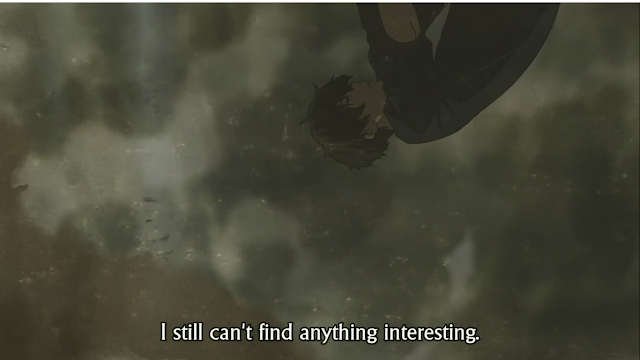Dos: Chapter 1
"There is only one evil - disunity." - Pierre Tielhard de Chardin
They each led double lives: in their very being and desires.
They met online, and were texting now. They matched mutually, each other’s profiles one of the most real, written things out there, amidst the cesspool of men holding fish and doing headstands and women clad in what might as well be string describing their character traits as “love to travel and tacos.”
Tano’s read: I am a verb. In life, however, I am nearly a doctorate holder and an editor.
Bradon’s read: I may say too much, or too little. I will compromise and just say that I have a green thumb and good teeth.
Each having read the profile of the other and being equally impressed, they proceeded to talk, he of going for the first swim of whatever this year is, and she of Hannibal Lecter. Later they exchanged links to their respective blogs, and it wasn’t before long that they started quoting each other’s writings with praise: “Damn, girl,” or “Damn, son.”
“Baby,” she said this particular day, “what do you think of me going to a Prague university to finish my Philosophical Sociology doctorate?”
As soon as leaving her mouth and hearing his answer, she knew the question was ill-timed (he was distracted with returning to Czech reserve Army training two weeks from now) and too soon (they had only been talking for two weeks). She regretted it even more when he replied, “Uh… That’s too much for me to process right now, baby. And it’s too quick. Anyway, which do you like more – my body or my brain?”
Earlier, while she had been waiting for Brandon to wake up, Lord, her kiwi friend, called.
“Hello, dear,” he said, using the term of endearment only reserved for a friendship such as theirs. He didn’t want her in any sexual way, and thus could call her anything she wants without malice or irony. At first she was bewildered, but came to the acceptance of his decision.
“Good morning, dear,” she replied.
They proceeded to talk for thirty minutes about the differences between geeks and nerds, and he told her about his walk in the park, the Pokémon he caught for Valentine’s Day, and how he, desperately wooing a woman while being a computer nerd, gave her they key of D from a keyboard and relishing how she had kept it after two years.
“You’re predictable. You’re normal. You’re safe,” she declared.
Hanging up the call after that, and not having anything else to do (while waiting for Brandon to wake up) and being too distracted to work on her editing, proceeded to look for universities in Prague that offered a Doctor of Philosophy and Sociology cognate. She found five such universities, and with trepidation, as always (she had imposter’s syndrome), proceeded to email all of them. She attached her dissertation topic proposal to the emails, as well as her latest transcript of records consisting mostly of A’s and A-‘s (except for a B+ in Research).
Her dissertation topic was twofold:
The temptation to think in dualist terms, it will be argued, has put modern sociology in a straitjacket, leading to reified and static causal accounts of where to put primacy in terms of social explanation.
The dissertation hopes to show that the hierarchized polarity between agency and structure as seen in both classic and modern social theory ultimately falls short when attempting to elucidate a comprehensive social ontology. (Gods, she hated writing academically; for she was good at it.) Giddens, “the main interpreter of modern social theory (Craib, 1992) and his Structuration Theory, “his most significant contribution to social theory, (Graaf, 35) presents a fundamentally different understanding alternative to understanding social ontology. Unlike its modern predecessors in social theory, it can be read as a theoretical unification the explanatory power of which goes beyond both top-down (or macrotheoretical, or structure) and bottom-up (or microtheoretical, or agency) approaches.
This increase in explanatory power, however, comes with a price. In moving beyond the dualism of agency and structure, Giddens places himself in no certain established position within modern social theory: he has been accused of being “foxlike,” a “honeybee flitting from theory to theory,” and “quintessentially postmodernist.” Reading his work is like “trying to catch quicksilver.” (Craib, 1992) At bottom, however, he avoids the blinding effect of a closed and deductive social theory and instead concerned with the openness of history and of human action. (Cohen, 1989)
In light of this, the non-linear nature of rhizomatic ontologies of flow, particularly that of Deleuze and Guattari, is hoped to lend Structuration Theory more robustness in terms of showing how it is an instantiation of a rhizome, instead of an arboreal root-tree type of ontology, which works with dualist categories of binary choices, always within the purview of systematic origin.
Delighted that she wrote all that within fifteen minutes with minimal editing, she pondered on her life-long question: What does it mean to be human?
She remembered Brandon's answer to her hypothetical again, and felt dread. It was indeed too early for that question, for any question.
If only Lord could have been a writer, she mused. He was the most human man she has ever met, and she was certain he can answer the question, while eating his non-gluten ice cream.



Comments
Post a Comment